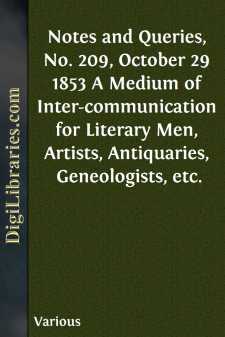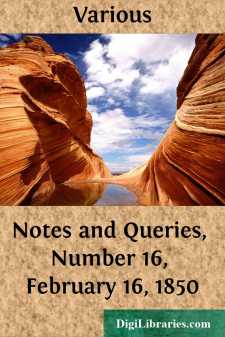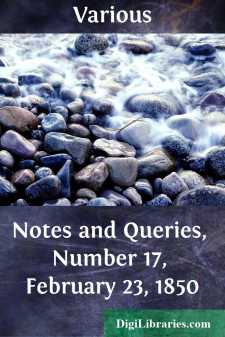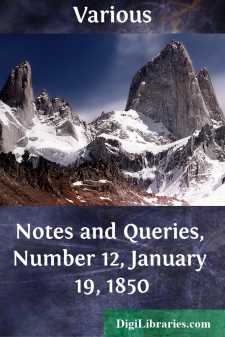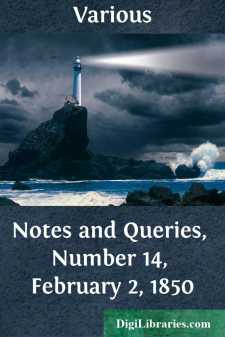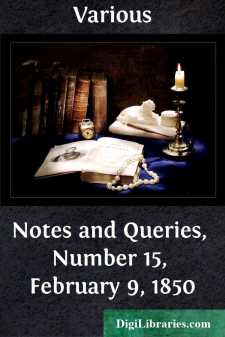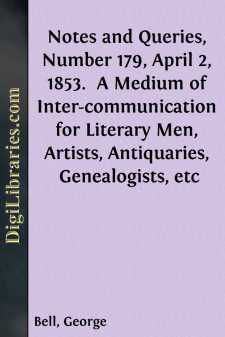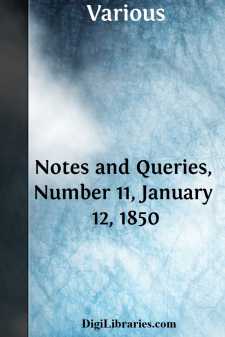Periodicals
- Art 27
- Children's periodicals 59
- Entertainment 5
- Food/Wine 2
- Games/Humor 455
- General 661
- Health 1
- History 53
- House/Home 1
- Regional 62
- Science/Nature 118
- Transportation 10
Periodicals Books
Sort by:
by:
Various
THE SCOTTISH NATIONAL RECORDS. The two principal causes of the loss of these records are, the abstraction of them by Edward I. in 1292, and the destruction of a great many others by the reformers in their religious zeal. It so happens that up to the time of King Robert Bruce, the history is not much to be depended on. A great many valuable papers connected with the ancient ecclesiastical state of...
more...
by:
Various
NOTES. DANIEL DE FOE AND HIS GHOST STORIES. I feel obliged by your intelligent correspondent "D.S." having ascertained that De Foe was the author of the Tour through Great Britain. Perhaps he may also be enabled to throw some light on a subject of much curiosity connected with De Foe, that appears to me well worth the inquiry. Mrs. Bray, in her General Preface prefixed to the first volume of...
more...
by:
Various
KING ALFRED'S GEOGRAPHY OF EUROPE. The sketch of Europe, which our illustrious Alfred has inserted in his translation of Orosius, is justly considered, both here and on the Continent, as a valuable fragment of antiquity; and I am sorry that I can commend little more than the pains taken by his translators, the celebrated Daines Barrington and Dr. Ingram, to make it available to ordinary readers....
more...
by:
Various
OUR PROGRESS We have this week been called upon to take a step which neither our best friends nor our own hopes could have anticipated. Having failed in our endeavours to supply by other means the increasing demand for complete sets of our "NOTES AND QUERIES," we have been compelled to reprint the first four numbers. It is with no slight feelings of pride and satisfaction that we record the...
more...
by:
Various
ORIGIN OF A WELL-KNOWN PASSAGE IN HUDIBRAS. The often-quoted lines— "For he that fights and runs away May live to fight another day," generally supposed to form a part of Hudibras, are to be found (as Mr. Cunningham points out, at p. 602. of his Handbook for London), in the Musarum Deliciæ, 12mo. 1656; a clever collection of "witty trifles," by Sir John Mennis and Dr. James Smith....
more...
by:
Various
DOMINGO LOMELYN, JESTER TO HENRY VIII. Shakespeare, in the Second Part of Henry IV. act v. sc. 3 makes Silence sing the following scrap:— "Do me right, And dub me knight: Samingo." And Nash, in his Summer's Last Will and Testament, 1600 (reprinted in the last edition of Dodsley's Old Plays, vol. xi. p. 47.) has "Monsieur Mingo for quaffing doth surpass, In cup, in can, or glass;...
more...
by:
Various
ENGLISH AND AMERICAN REPRINTS OF OLD BOOKS Most people are aware of the great demand there is for English literature, and indeed for all literature in the United States: for some years the anxiety of persons in that part of the world to obtain copies of our early printed books, prose, poetry, and plays, has been well known to such as collect and sell them on this side of the water. Where American...
more...
by:
Various
MARLOWE AND THE OLD “TAMING OF A SHREW.” I regret that my communication (No. 13. p. 194.), on the subject of the authorship of The Taming of a Shrew, was too late to be of any avail for the already-published new edition of Marlowe’s works; and, had I been aware of such being the case, I should have waited until I had had an opportunity of seeing a work whose editor may entertain views in...
more...
by:
George Bell
JACK. I wish to note, and to suggest to students in ethnology, the Query, how it comes to pass that John Bull has a peculiar propensity to call things by his own name, his familiar appellative of Jack? Of all the long list of abbreviations and familiar names with which times past and present have supplied us, that which honest Falstaff found most pleasing to his ears, "Jack with my familiars!"...
more...
by:
Various
SIR EDWARD DERING'S HOUSEHOLD BOOK, A.D. 1648-52. About ten years since, I remember seeing, in the hands of a London bookseller, a curious MS. purporting to be the "Household Book of Receipts and Expences of Sir Edward Dering, Bart., of Surrenden Dering, Kent, from Lady-Day, 1648, to April, 1652." It was a think folio, in the original binding, entirely in the hand-writing of the...
more...


